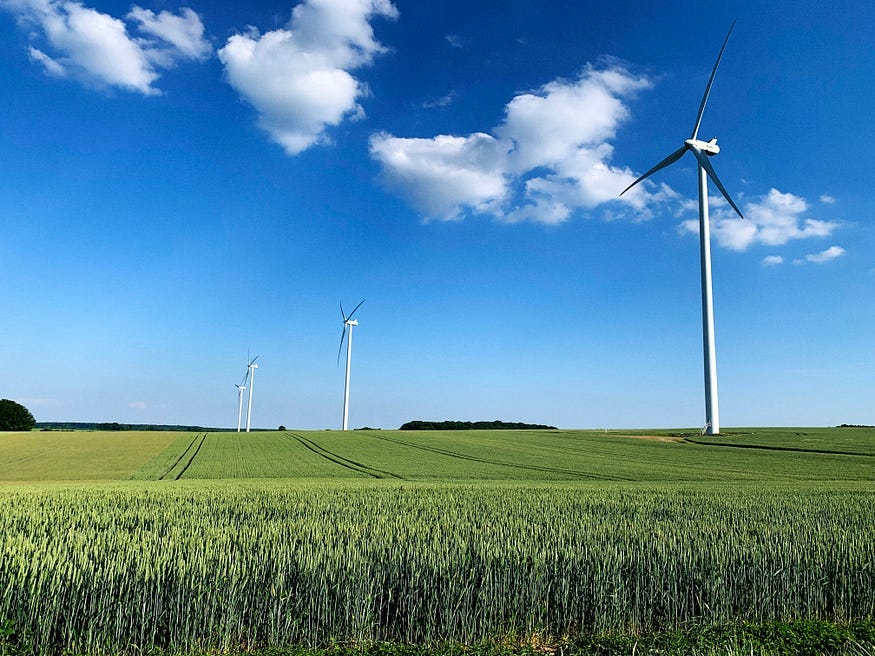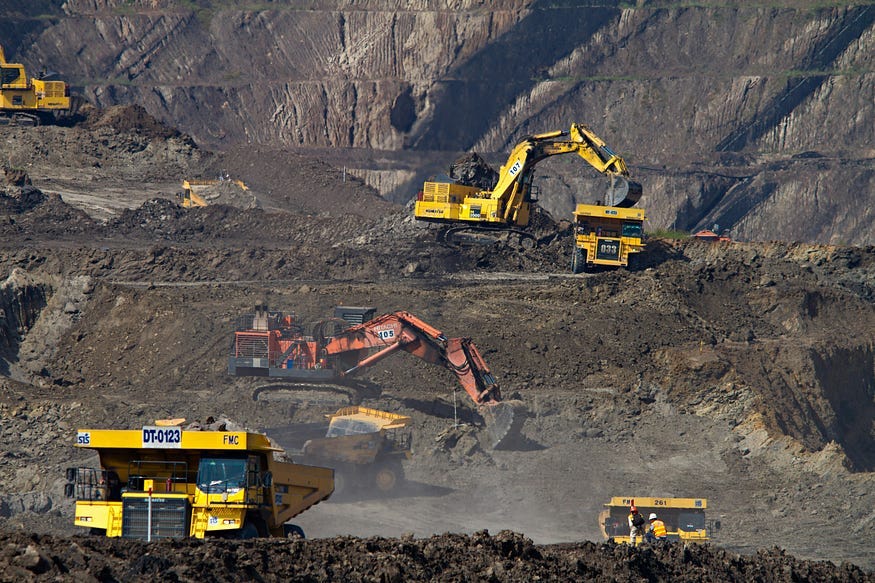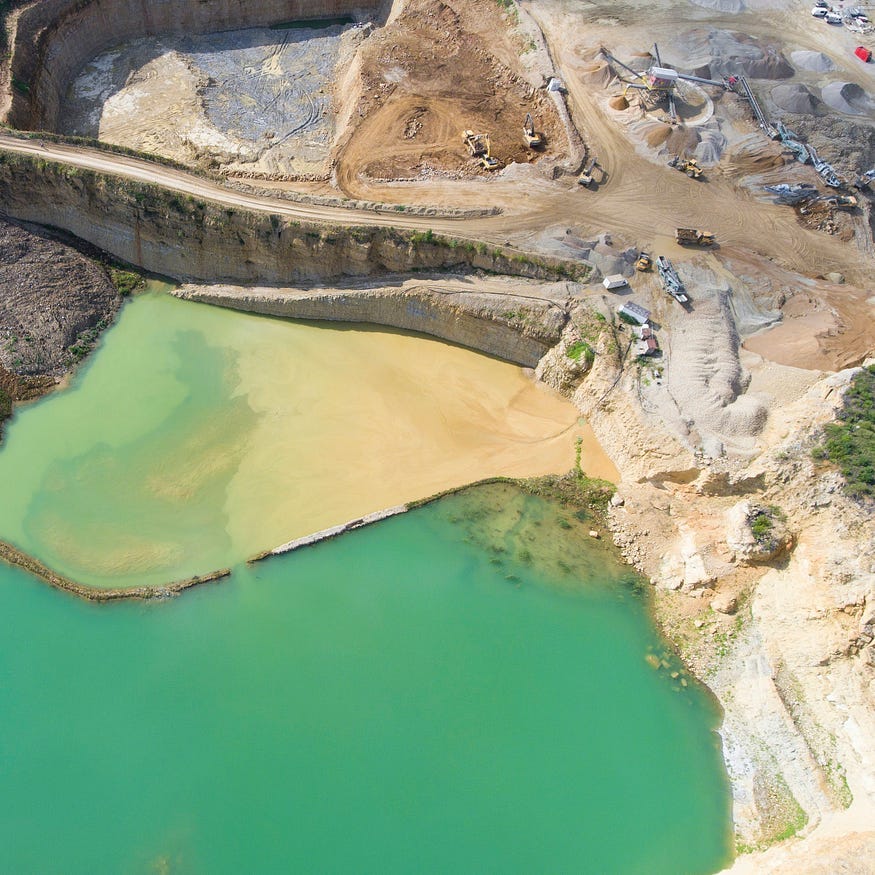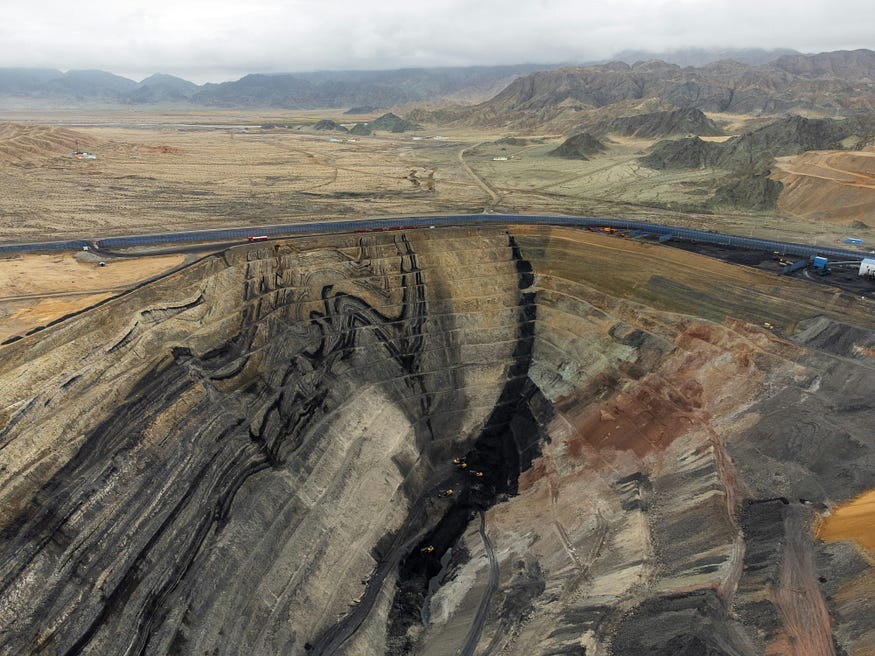We Are Not Mining with Renewable Energy
…and when we do, shit is going to get real

There are no “renewables” without mining, an unsustainable practice turbocharged by burning fossil fuels. Yet, advocates of green technologies still believe that we could somehow electrify the recovery of critical minerals, and continue with civilization in a “business as usual but greener” manner. In reality, this could not be further from the truth.
Before we delve into the topic of using renewables to continue extracting metals from Earth’s crust, let’s tackle the environmental aspects of this activity. And while at it, let me also draw your attention to the deep and intimate relationship mining has with burning fossil fuels. What a fascinating — but also disastrous — symbiosis of technologies…
Perhaps it’s no exaggeration to say that the term “building a mine” is actually an euphemism for environmental destruction on a truly industrial scale. First of all, opening a site for mineral extraction inevitably comes with destroying a green blanket of a living habitat. It takes large harvesting machines cutting down all those trees and shrubs — all powered by burning diesel fuel, as there are no power plugs nearby to do all this with electrified chainsaws. Then a bunch of diesel guzzling excavators and bulldozers are brought on site to build roads leading to the would be mining site. Next, a fleet of trucks arrive to haul all those logs away — again, by burning diesel — as the distance and load is usually far-far beyond what an electric semi could cover.

Once the site is cleared of all life and all the topsoil was removed (or destroyed in the process), explosives are used to blast away rocks covering those precious ores we are about to go after. This often means removing and crushing thousands of feet of hard stone, which is then get spread on the newly built dirt roads to make them sturdier. In some cases a mile or more of rocks will have to be removed, before any mineral extraction could be started. This process usually takes years, or a decade even, till the actual mining equipment can be brought on site at last, together with power lines to bring the stationary machines to life. (If there are no power lines nearby, an electric generation facility has to be built (burning fossil fuels of course) due to the energy density these fuels provide.)
Finally, when the mine starts operating, diesel powered excavators and dump trucks begin to do the shoveling, working in concert with explosive engineers exposing layer after layer of the ore they are going after. (Note: we no longer pursue seams of high grade metal deposits in deep mine shafts — that stuff is long gone. Mines increasingly have to process large amounts of ore with ever lower metal to rock ratios, and the only way to do that is to open huge open pits the size of the Grand Canyon.) Ores brought up by diesel trucks then need to be crushed to a fine powder using electric grinding machines and mixed with aggressive chemicals (like sulfuric acid, a byproduct of refining oil) to leach out their metal content. Once scrubbed for metal salts (the end product of mineral extraction), this process leaves behind a huge toxic tailing, another ticking time bomb waiting to explode. All this to exploit a finite resource then moving on to the next prospect.

No wonder people around the world oppose even the idea of a mine being opened in their neighborhood: living downstream any such operation is a disadvantageous proposition, to say the least. Rivers, lakes and groundwater often get contaminated with heavy metals and poisonous chemicals, making the water unsafe for even using in people’s backyard gardens. It also leads to sinkholes, erosion, increased noise and dust levels, biodiversity loss and habitat fragmentation. Mines also compete for water with local communities, and tend to increase worker exploitation in the area. ‘Not in my backyard’ is not just a fancy slogan for local communities, but a matter of existential nature.
If all this haven’t taken your appetite away from mineral extraction, you might ask: why don’t we power this activity with “renewable” electricity then? OK, but which part? Excavators? Probably in a coal mine going after a soft seam of pure lignite. But metals needed for renewables are often embedded in hard rock, requiring a caterpillar driving around and hauling massive rocks on a dumper. Trucks, then? Sure, in a clay or limestone mine located near the surface, up on a hillside. Electric dumper trucks are a thing exactly for this purpose: to be loaded on the top of a hill, then to be driven down to the valley where these materials are used in making cement. The weight difference between the light ascent and heavy descent is enough to charge the batteries, and make the climb back to the mine a freebee. In an open pit however, you have to drive down to a man-made canyon empty and climb back loaded with heavy ores — exactly the opposite what is needed to charge the batteries on the way. This means that you would need huge solar panel and wind turbine installations near the pit where the trucks would spend at least half of their useful time charging.

Apart from the obvious question of ‘just how economic is that?!’, this leads us to a much more ominous phenomenon: resource cannibalism. As long as we mine using diesel machines mostly built from abundant steel, and burning fossil fuels, there is little to no copper, lithium, cobalt etc needed to be invested into the extraction of the metals much needed for the “transition”. However, if we were to switch to mining with renewables and electric trucks (were that technically feasible), we would need to build tons of these precious “transition” metals into the very equipment used to obtain them, and replace them several times over their lifecycles. Thereby mining would actively compete for the very metals they are going after.
Consider also the not so insignificant role of long distance transportation. Remember: mines are often located far away from industrial centers where the refining, smelting and manufacturing takes place. If we were to believe that these logistic activities could be electrified too (which I seriously doubt), we would face an even bigger share of lithium, copper, cobalt, aluminum etc. cannibalized for the sole purpose of extracting more metals… All this to build even more renewables powering even more mines, needed to build more electric vehicles, required to bring all those ores to the surface.
And here is the real kicker. As rich metal deposits deplete, the industry is forced to go after ever worse ore grades (meaning ever lower amounts of metal recovered for the same amount of ore hauled up from the pit). And just like with fossil fuels, this translates into an ever increasing energy demand per ton of metal produced. This implies that energy cannibalism (a topic I addressed last week) will just get exponentially worse with electrification. Not only will we need to drill ever more energy intensive oil wells year after year just to stay where we are, but we would also need to use that ever harder to get fuel on ever more energy intensive mining projects... This way energy would not only be cannibalized by oil wells themselves, but metal mines as well. Energy cannibalism could thus only be made worse by trying to electrify mining — leading to the cannibalization of even more energy, and even more of the hard earned metals needed to run the industry. (Oh, and by the way, the same goes to fusion, and making manufactured fuels like hydrogen or synfuels… just saying.)

You see, there is much more to the topic of sustainability than reducing CO2 emissions, important as it is. First of all, mining is a grossly ruinous process (and the same goes to the extraction of fossil fuels, too). Second, all sites are posed to deplete over time, and new ones have to be opened constantly, usually on a spot even further away from civilization, and involving lower and lower grade resources. This will further accelerate energy and material cannibalism — a process driven by geology and physics. Third, all mining activity involves burning fossil fuels, due to their high energy density needed for this heavy work. This not only causes emissions to rise, but also exposes how “renewables” rely hopelessly on yet another set of finite resources: fossil fuels.
In an irony of ironies the much touted “clean” technologies aim to replace the very fuels which make building them possible in the first place. Thus the very idea that mining can be made “sustainable” defies logic, and should be considered as an insult to our intelligence.
To make matters even worse, ore degradation and the resulting increase in energy use is an exponential process. This means that the energy needed to continue extracting Earth’s resources doubles every few decades or so — a process which could easily bring civilization to an impossible position. Again, throwing more technology at the “problem” would just make it worse, as every increase in technological progress comes with additional complexity, meaning higher material and energy use. Technology can recreate neither rich mineral reserves, nor fossil fuels which has enabled this unprecedented bonanza in the past couple of centuries. We cannot discover and loot a third hemisphere either — there is none.
Despite all our effort we could thus find ourselves surprisingly fast in a place where the world economy could no longer afford to mine metals and drill for oil at the same time. As a result availability of both renewables (with or without “sustainable” mining practices) and oil can be expected to fall precipitously in the decades ahead. Contrary to contemporary beliefs though, this would not lead to a barrel of oil or a kg of copper setting traders back with a thousand dollars each. Quite the opposite: we will experience this as an affordability crisis.
The competition for energy and materials among the industries producing it, and the manufacturing firms using them up will keep increasing. As a result companies will have to spend an ever growing share of their revenue on fuels and electricity, and at the same time suppress wages to stay competitive. Consequently consumers will face the same dilemma as the corporations employing them: becoming no longer able to buy that new car, refrigerator, home etc., and pay for fuel and electricity at the same time. With a dampening demand it will increasingly look like that the world no longer needs more oil and metals. For clueless economists this will look like the biggest slump they’ve ever seen. Something, which will eventually lead to a similar drop in raw material and energy prices, and the cancellation of most new mining and drilling projects... Energy is the economy. No energy, no economy, no mining.
As a direct consequence of energy cannibalism, supply and demand for both oil and metals will walk hand-in-hand downhill a long winding road… Descending to the endless steppes of a post-industrial age.
So, what sort of technology will be available in the late 21st century? Following the logic of energy and resource cannibalism it is not terribly hard to see where things are headed. It increasingly looks like to me that we are hurtling towards a steadfast deindustrialization of the entire world economy, and a radical re-localization of the production of essentials. Even though we still might have abundant iron or aluminum (bauxite) reserves, we are already in the process of running out of affordable energy to process them. Iron ore represented 93.4% of all metals mined in 2021, and all of it was delivered and smelted using fossil fuels — mostly coal. Without enough diesel fuel though, the remaining vast iron and coal reserves will remain under ground, as there will be no way to haul away the miles of rock covering them. Sorry, but no diesel, no coal. And no coal, means no steel. And with a drastically diminished steel production, it would be even harder to build more mines, railroads, processing plants, wind turbines, you name it. No steel, no manufacturing, no construction, no complex society.

Once large scale coal and oil extraction will be gone though, our descendants will be increasingly forced to return to burning charcoal to process the scrap metals left behind by us. This would not only mean rapid deforestation but also a drastic drop in metal production and recycling. I wager that more than 90% of the materials in circulation today will be lost during the long descent of modernity, as we will have no capacity to process them. Most of our metals will simply be left to rot and rust where they are. And as we have already depleted all easy to access high grade ores (amenable to artisan mining and smelting techniques) our descendants far into the future will eventually have nothing to extract from the Earth. Surely not with a pickax and ox-drawn carts. We will thus first see the emergence of a vibrant scavenger economy, salvaging and repurposing whatever they can as modernity starts to break down, then as we lose metallurgy due to the lack of energy to power it, our children and grandchildren will witness the complete loss of all our modern technologies. Sure, they will have an odd blacksmith here and there, but that’s about it.
Dark ages after collapse are not due to a loss of human intelligence, but to a loss of complexity.
The future without mining will be so low tech, that it is hard to imagine for anyone living today. So, when envisioning life a few centuries down the road, rather than picturing a bustling city from the 18th century, ripe for another round of industrialization, we should start harboring thoughts of the return of the Neolithic. Of course with a drastically degraded wildlife and topsoils, a ruined climate, sea level rise, a landscape peppered with radioactive and toxic waste sites, Earth will not be able to support millions of humans trying to relive their ancient past… But that’s another story, for another day.
Until next time,
B
The title of this article is a tribute to the work of Simon Michaux, geologist, mining engineer and author of a number of in depth studies on the subject.
Thank you for reading The Honest Sorcerer. If you would like to support my work, please subscribe for free or consider an annual subscription, perhaps leaving a tip. Every donation counts, no matter how small. Thank you in advance!





One might argue that civilization and 'intelligence' are the two worst things to every happen to a species
Great writing as per usual. I do find the co2/rising sea level stuff hard to stomach. Not that it really matters because the energy concerns will hit first.
To my mind the climate propaganda/green agenda/great reset is the cover story to manage degrowth (while continuing to make money for the 'stakeholder capitalists' as we slide down the Seneca cliff). After all you can't tell people civilization is ending.
96℅ of NOAA weather stations in urban heat islands..
https://heartland.org/opinion/media-advisory-96-of-us-climate-data-is-corrupted/
UK Channel 4 documentary from 2007 (when investigative reporting was still a thing)
https://www.youtube.com/watch?v=BY-gRFSaP7o